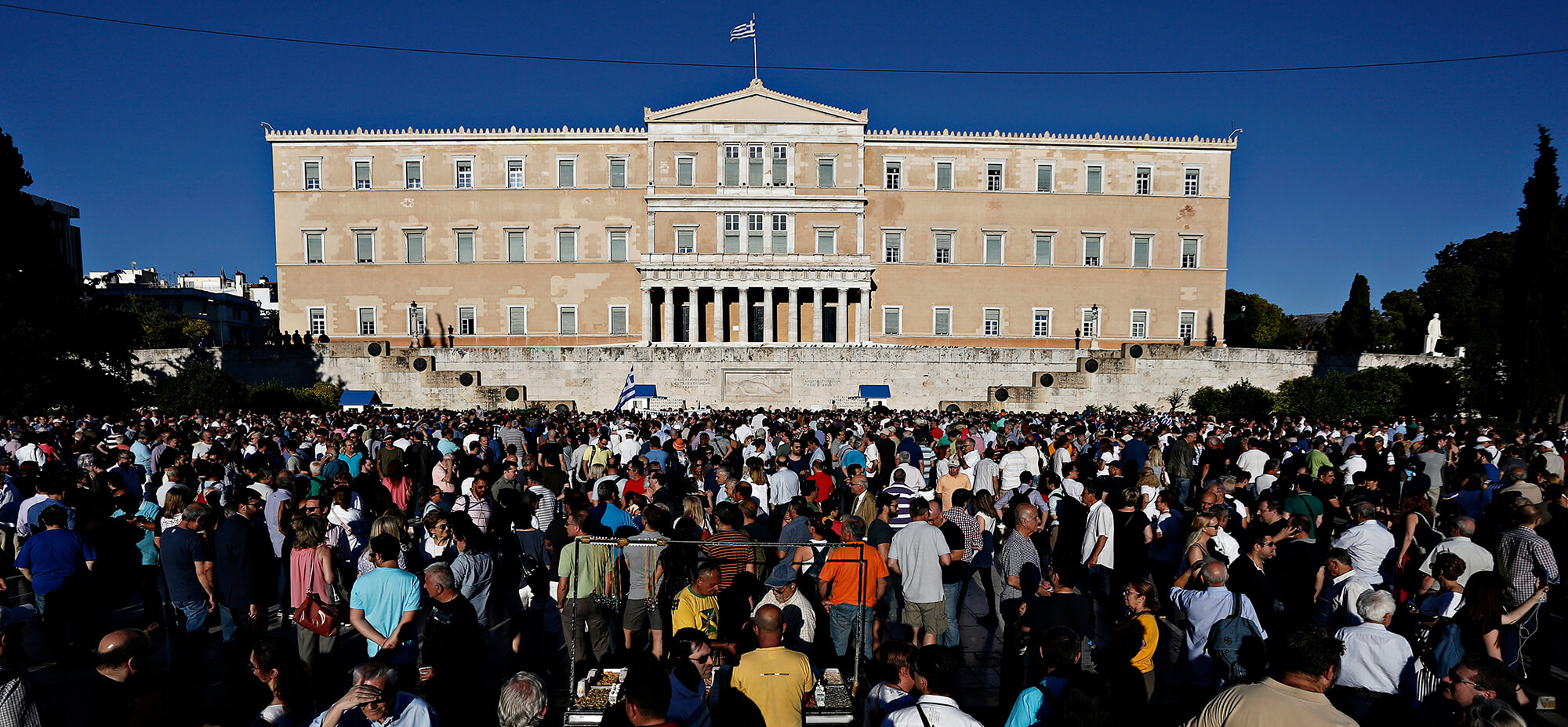Following the publication of the first part of the survey "What Greeks Believe - 2022", (a summary of its results can be found here) come the results of the second part of the survey. It was also conducted by research company MARC S.A. on a representative sample of the general population, involving 1,254 people aged 17 and over, using phone interviews and online panels held between 26 January and 5 February 2022.
This part of the survey includes questions about the economy, Greeks’ opinions on their state, their employment status and finances, on gender equality, as well as questions exploring the everyday life led by Greek people living in Greece today -ranging from whether they have pets to whether they have regular medical check-ups. The conclusions can help us understand how Greeks think, how they live, and how they perceive the world after the consecutive crises their country has experienced in the last decades.
You can read the results of the survey in full here, find a summary description of the key findings here, and access the complete, open datasets of the survey here (.xls and .sav). A report discussing the findings of the second part of the survey written by Thomas Gerakis, Head of MARC S.A., can be found here (and here in PDF). All reports and data files are in Greek. The key findings of the survey "What do the Greeks believe - 2022” can also be found here (also in Greek).
What follows are some of the main data and conclusions from the second part of the survey.
1. Economy & State
After two years of living with the pandemic, Greeks seem to have slightly shifted their attitude towards the state and its role in the economy. In December 2019, almost 6 out of 10 Greeks (58.2%) agreed that "state intervention is excessive and stops the private sector from creating wealth and jobs", while approximately 1 out of 3 (37.4%) thought that "state intervention is insufficient and lets the private sector act without control". Today, following the extensive and direct measures of intervention the state had to undertake in order to support economic activity and ease the impact of the pandemic, these two views appear completely balanced (45.4% each).
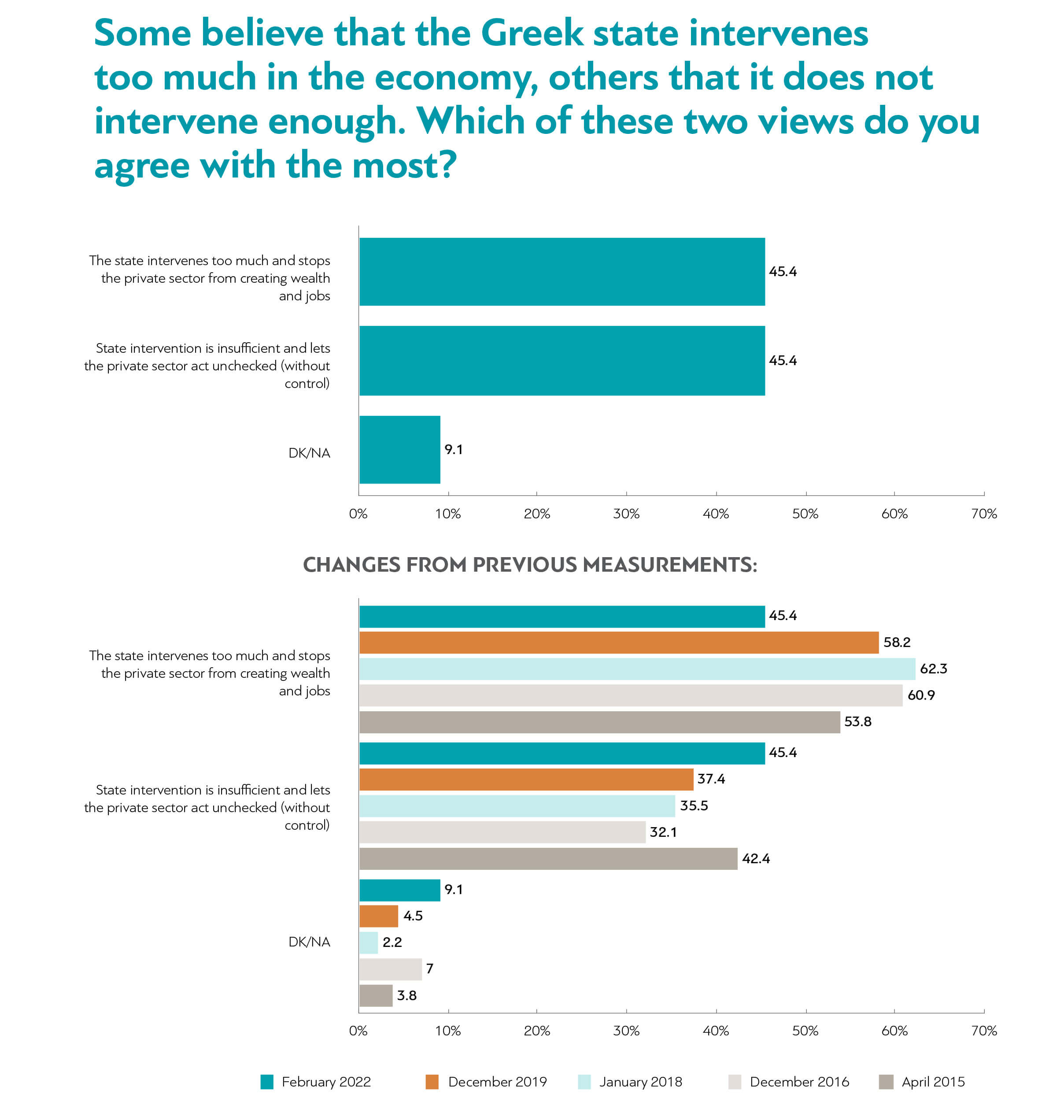
Nevertheless, the shift observed in the middle of the last decade in the Greeks’ attitudes regarding high taxation and a strong welfare state is still relevant today: only 1 in 3 Greeks believe that "there should be high taxation and a strong welfare state for all". The majority of Greeks still prefer low taxes to a strong welfare state -and this is consistent in all the surveys we have conducted since November 2015. At the same time, of course, it is worth remembering that to the question "which of the following countries has the best model of governance", which figured in the first part of the survey conducted in the same period, half of Greeks (49.9%) replied "Sweden". A country with very high taxes and a strong welfare state was by a very wide margin the answer chosen by most Greeks.
Elsewhere, citizens consider that the three most important changes that could lead to higher economic growth are, lower taxes, less red tape, and faster administration of justice -in that order. This is an interesting finding, especially when one considers that only 2.4% of respondents cite "increasing public spending" as a factor significant for growth.
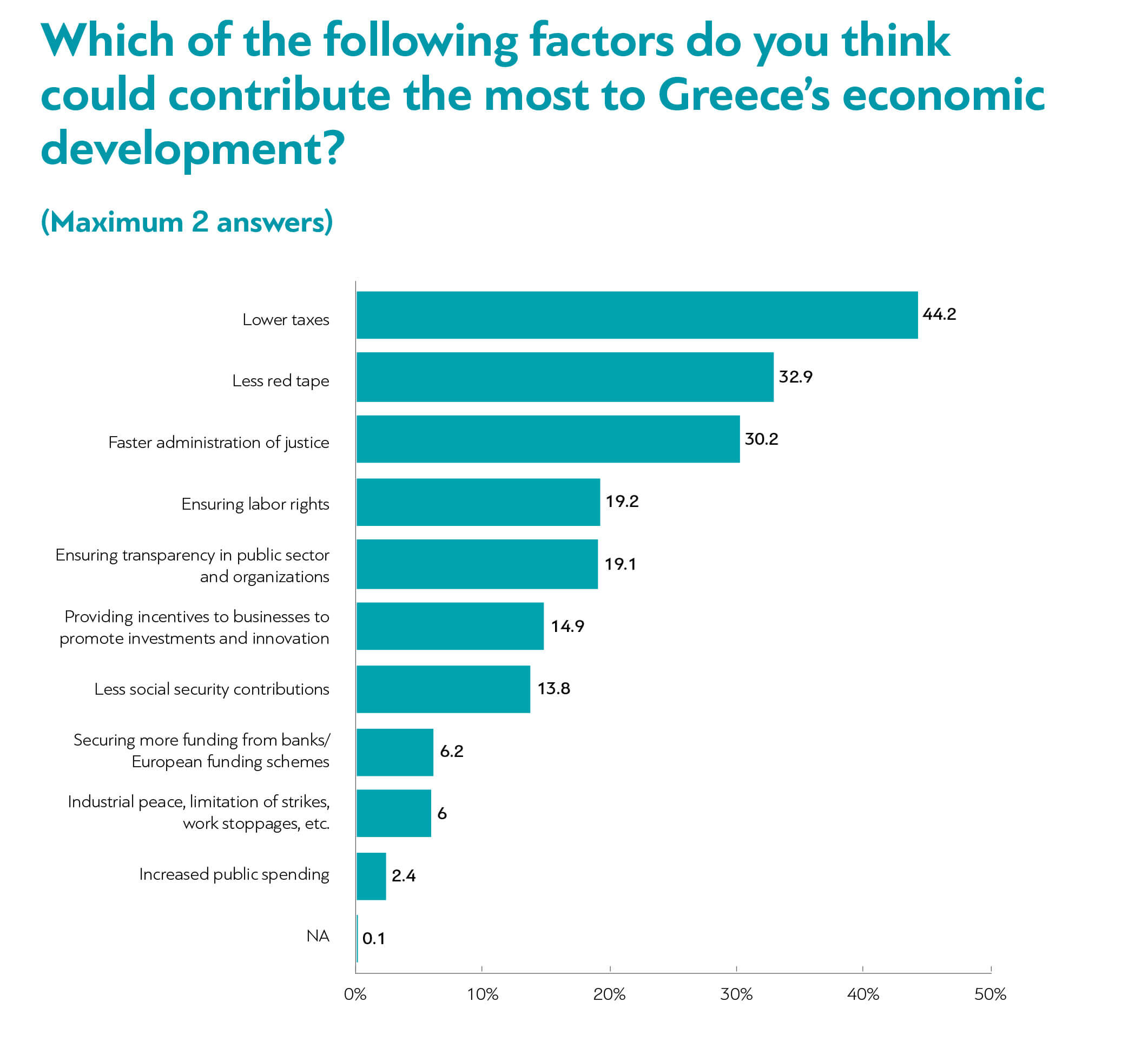
We then asked Greek citizens to rate twelve of the services provided by the state. Predictably, only a few of these services received a "positive" or "moderately positive" rating -just four. One service received only a small majority of positive views (the police, with 56% of respondents stating they viewed the service positively), while three others enjoyed much larger majorities (over 75%): the "gov.gr" portal; the fire brigade; and the Citizen Service Center (KEP) network.
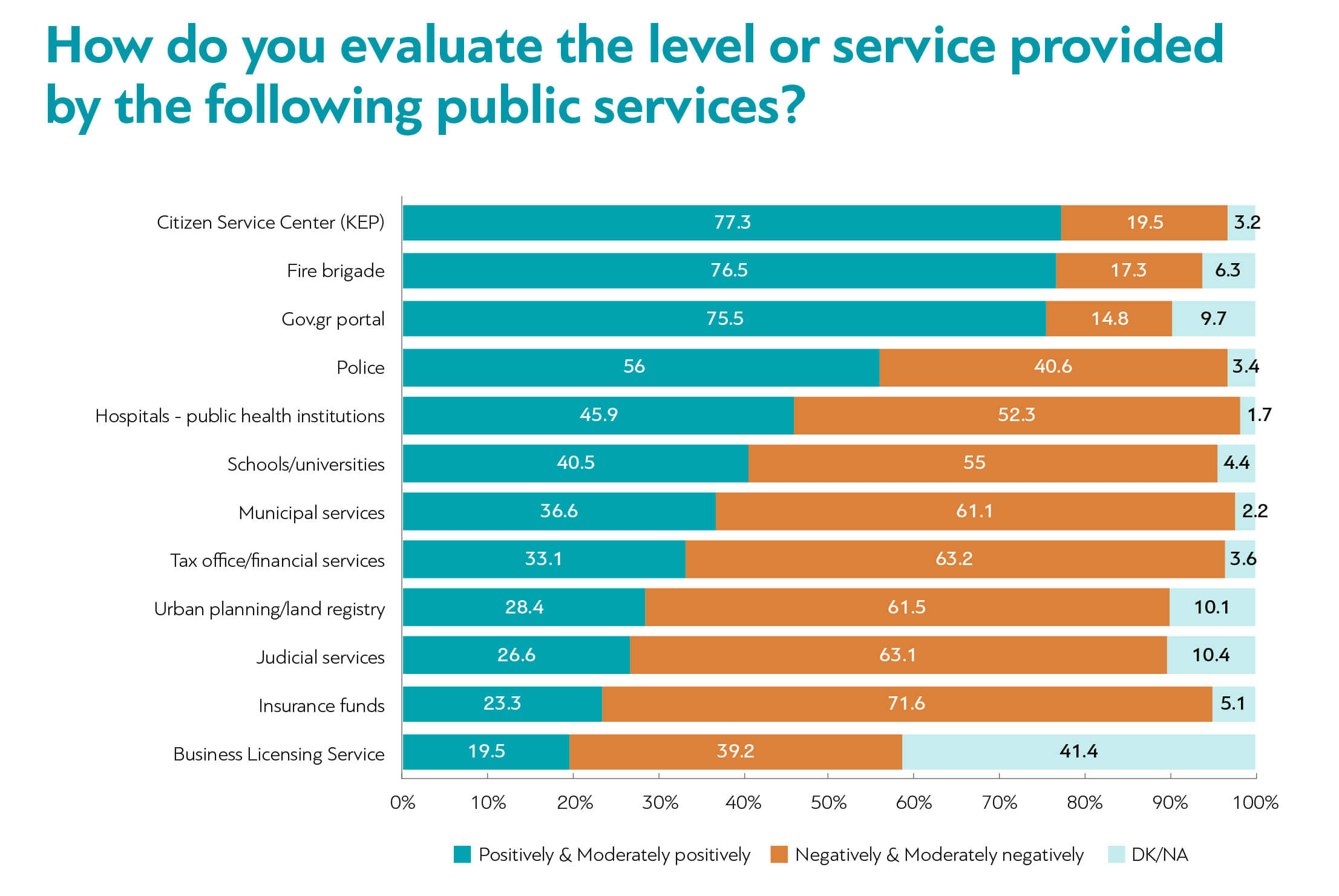
2. Employment & Equality
This part of the survey includes a series of questions intended to capture Greek views on issues related to work, education, and training.
In 2022 most Greek citizens (58.3%) still prefer "a stable job with a moderate salary and little prospects for development" to "a job with high pay, great prospects for development but no job security". This preference has been more or less stable over the last seven years.
This time, however, 36.4% of respondents stated that if they could choose a job, they would prefer to have "a salaried job in the public sector" -this is the most popular answer and the highest rate of preference for a job in the public sector that we have recorded since we started asking this question in 2016 (when the rate was 24.4%). At this moment, a job in the public sector is the most desirable form of employment for Greeks of all ages.
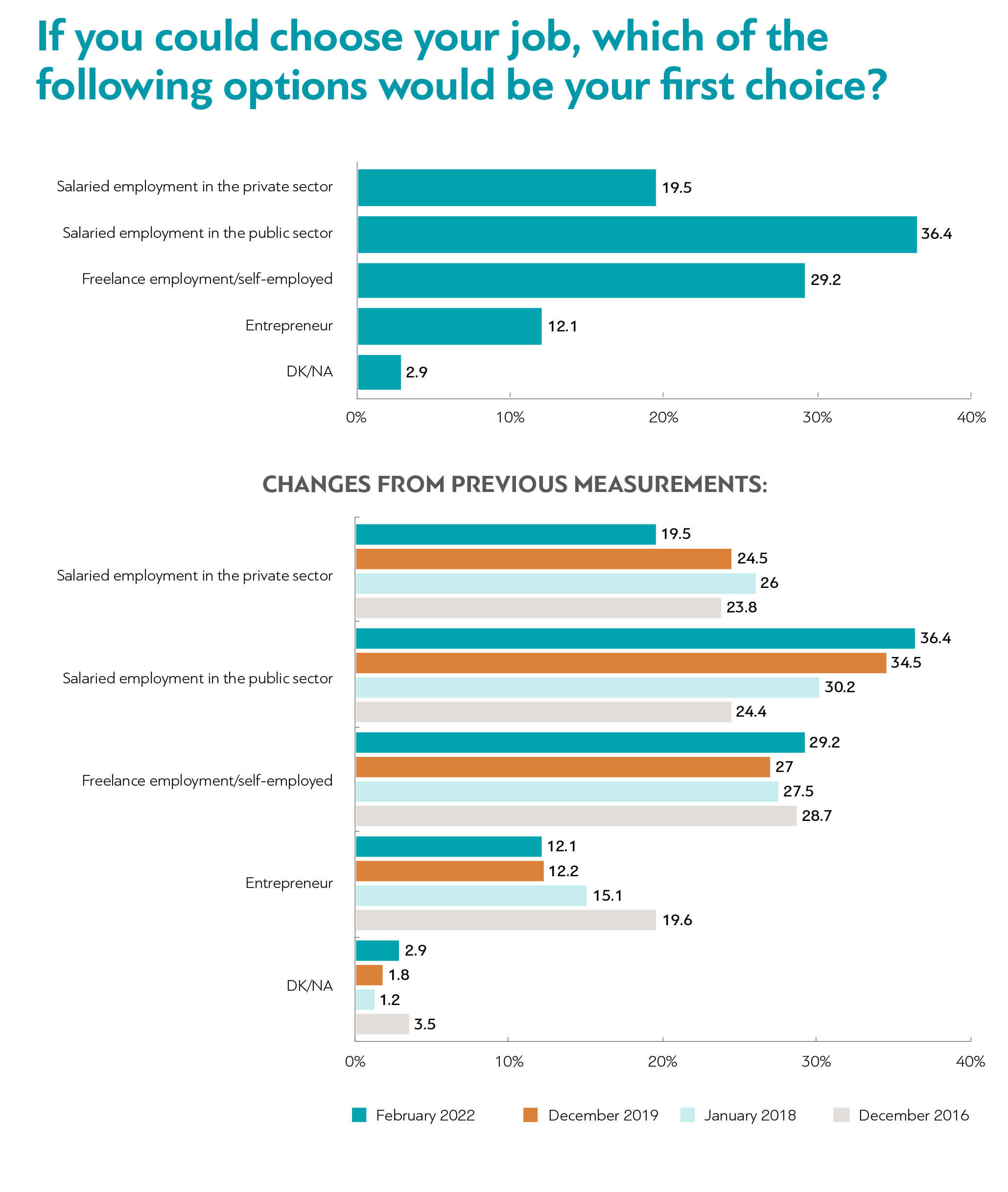
Furthermore, the majority of Greeks (55.4%) still believe that people should go on retirement before the age of 60.
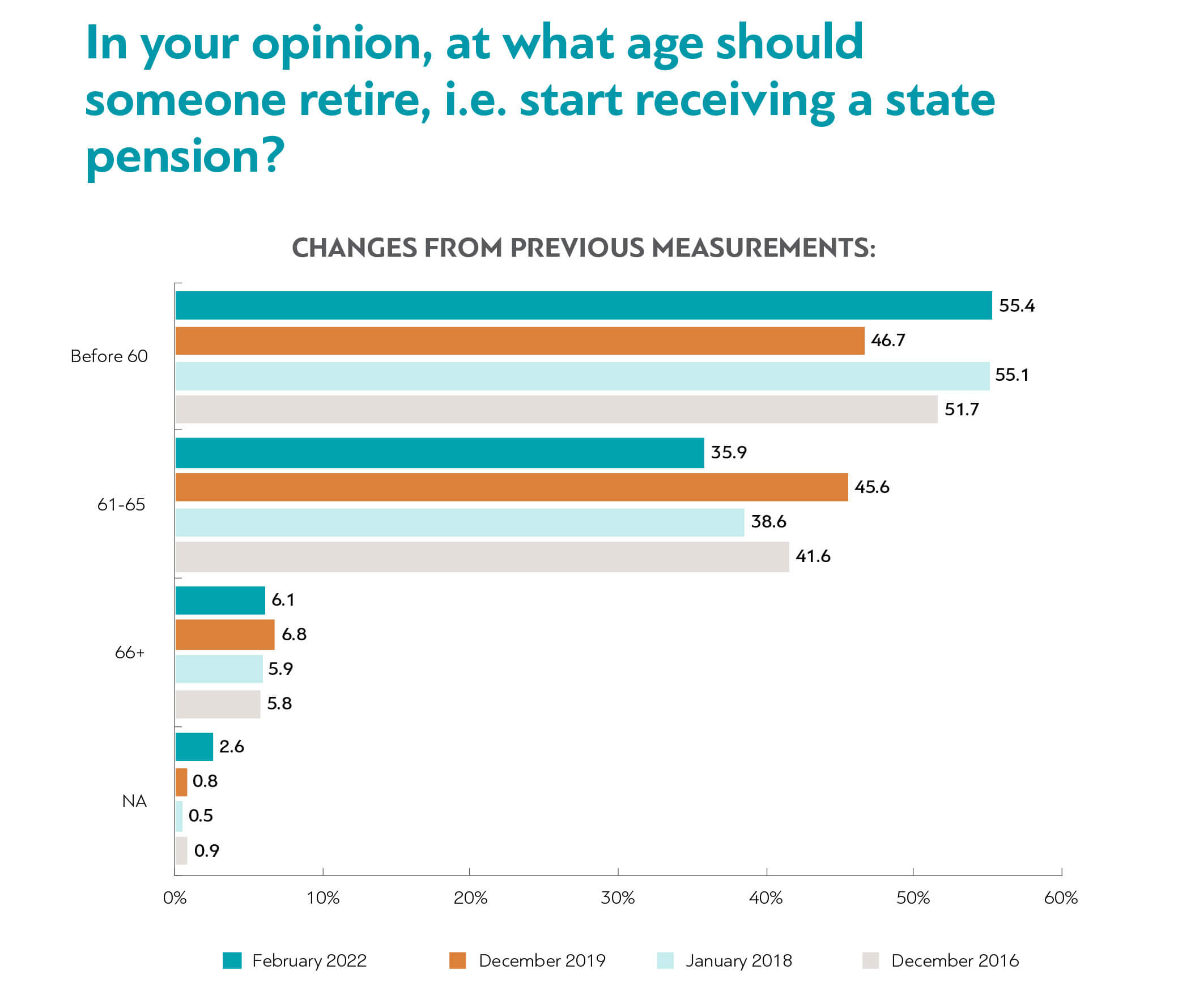
Also on pensions, only 1 in 3 Greeks (34%) believe that "their pension is secure" (down from 43.1% in 2019). For the 65+ age group (who are already pensioners, and for whom the connotation of the word "secure" in the question is likely to be different), the figure rises to 52%. It is worth noting that 1 out of 5 pensioners believes that his/her pension is not secure.
Among the Greeks who are actively employed, however (just 47.7% of the total sample), only half (52.2%) say they work a regular 8-hour week. Almost 1 in 5 of those actively employed work part-time (17.4%) and a very high 29.2% say they work more than eight hours a day.
And what was the impact of the pandemic on the working conditions of the Greeks? 39.1% of employees stated that their working conditions had recently "deteriorated".
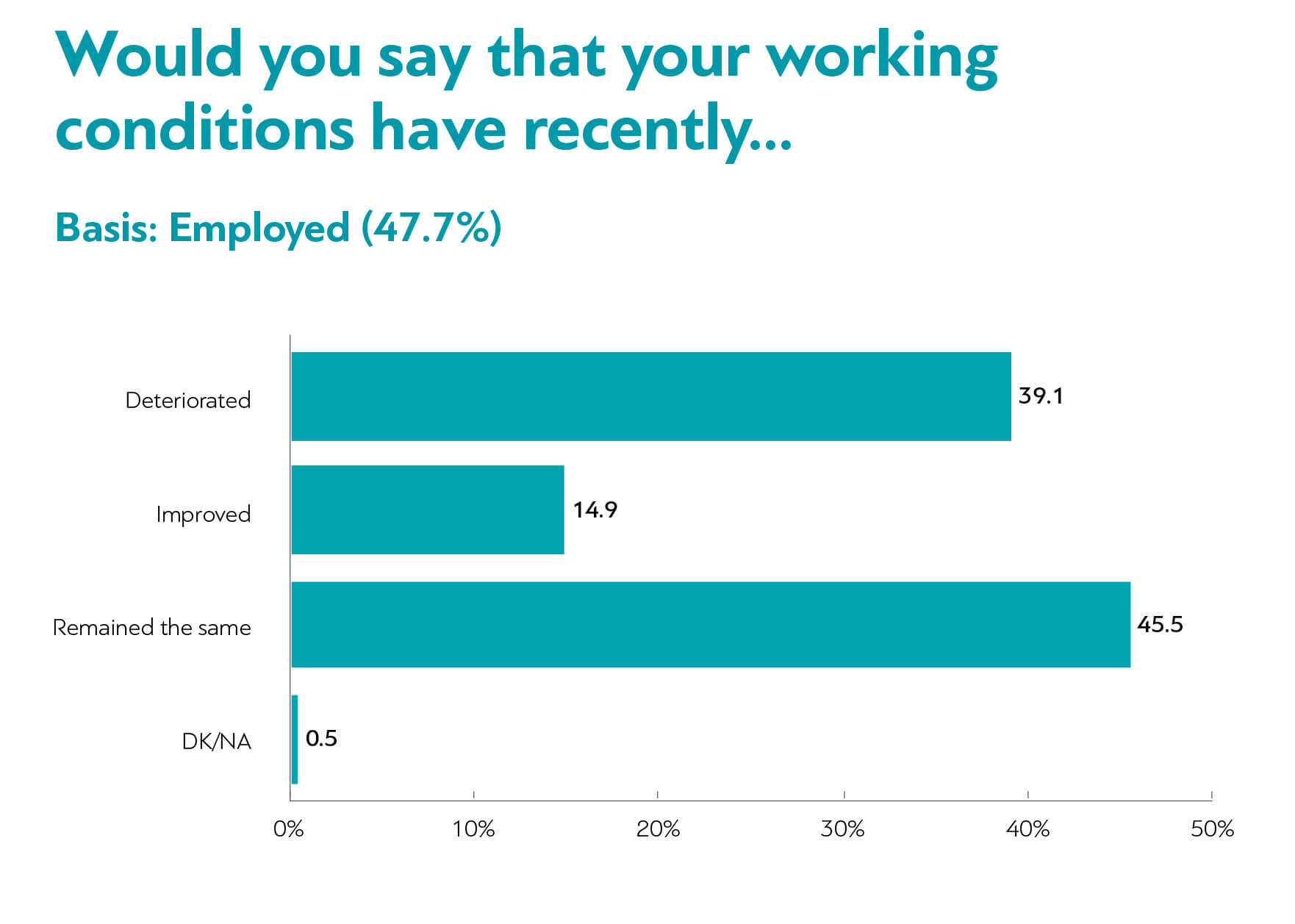
41.8% of those actively working responded that they have worked remotely during the pandemic. After the end of the pandemic, almost 1 in 3 workers (37.5%) would like to return to their regular workplace, but 1 in 4 (23.2%) would prefer "a flexible system which would combine remote working and limited on-site presence, reduced to only some days per week". There is also 6.9% (with the figure climbing to 7.6% among women and 22.2% among young people aged 17-24) who would prefer to continue working exclusively from home.
All this, however, does not point to a working environment that appears satisfactory to Greek people in active employment. Indeed, 57.9% of Greeks (77.1% of 17-24 year-olds and 71.9% of 25-39 year-olds) say that they "would emigrate abroad if they could find a job with better pay and better conditions"; while 38.1% of the general population answered "definitely” to the above question.
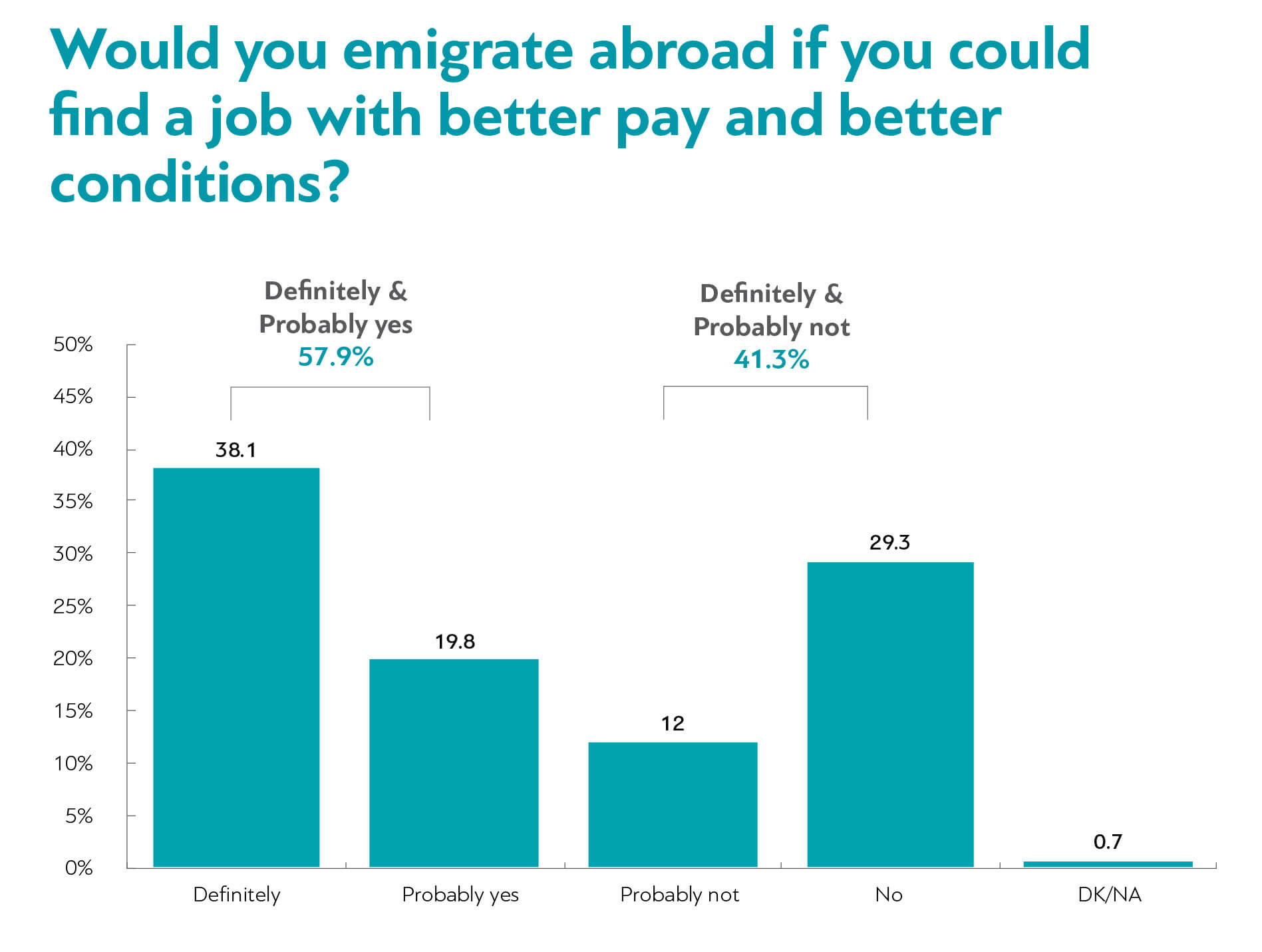
Regarding education, almost 50% of Greeks stated that they would choose to educate their children privately (48.8% "yes" and "probably yes" -compared to 40.6% in 2019) if they had the choice. In reality, of course, less than 5% of Greek children are in private schools.
Another very interesting point are the answers respondents gave to the question whether they would prefer "a university degree leading to job insecurity and low pay" or "a diploma from a technical school offering job security and higher pay". Paradoxically, only 18.9% chose the former -compared to 75.2% who chose a diploma offering job security and higher wages. These answers come in stark contrast with the choices Greeks actually make in practice -young people who choose a university education are consistently more than double compared to those choosing to pursue technical training.
In addition, some interesting findings came to light concerning the participation of men and women in the labor market and, more generally, questions related to equality. Approximately half of the population (48.7%) consider that "women and men have the same opportunities to find work". Of course, men (60.7%) and women (37.2%) gave significantly different answers on this one. Similar differences are noted in other questions: 54.9% of men believe that "women should focus more on their family life rather than their career", compared to 42.7% of women who agree with this statement.
However, 93.4% of the population agrees that "mothers and fathers should have exactly the same amount of responsibility in the care of their children".
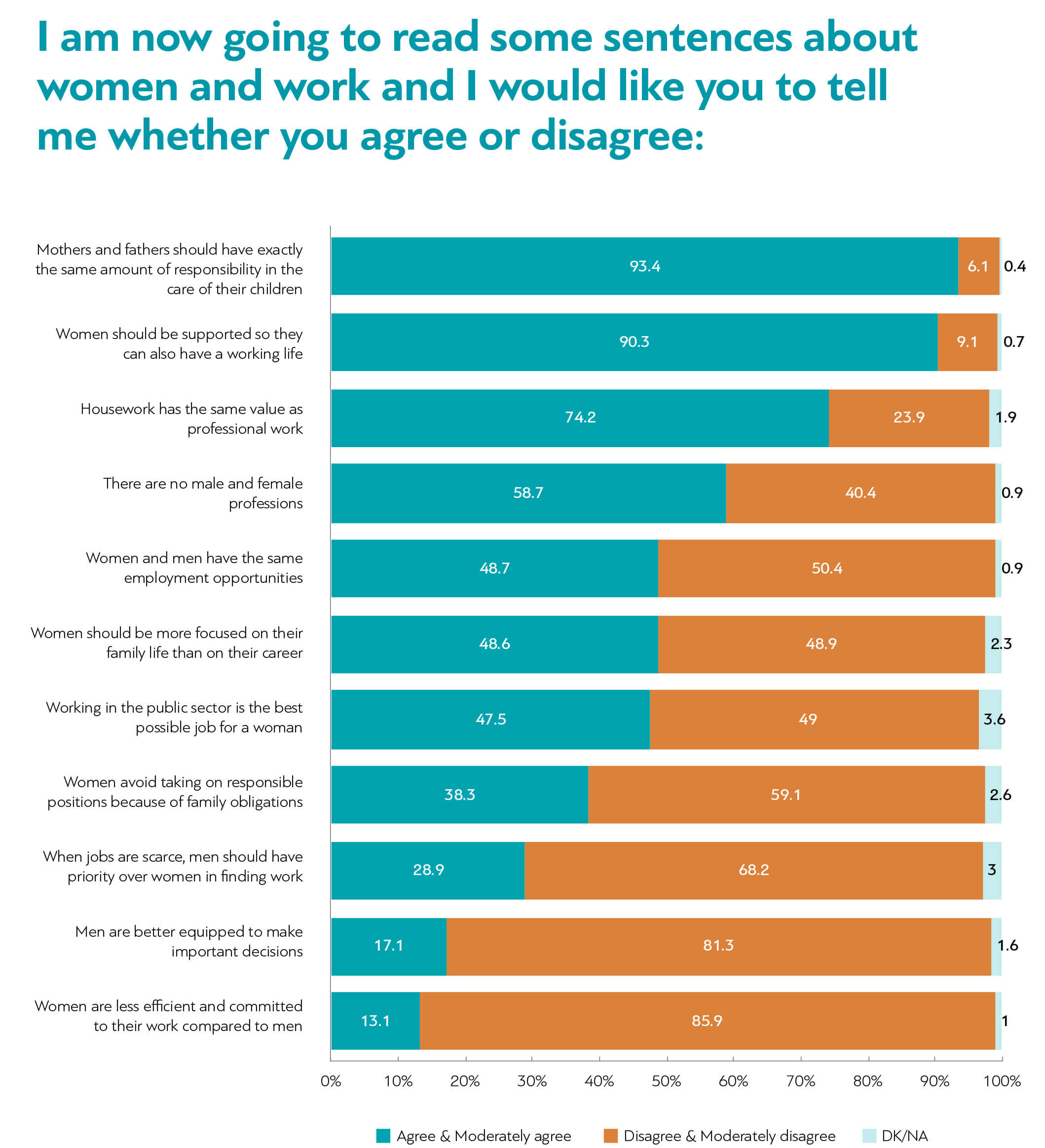
3. How do Greeks live?
As we did in 2019, in this year’s "What Greeks Believe" survey we also included some questions which are not exactly aimed at capturing opinions or beliefs, but at gathering data about the everyday life of Greek citizens. A "How do the Greeks live?" survey, as it were. Some interesting findings emerged from this set of questions. For example:
8% of Greeks stated that they do not eat meat
76.1% stated they are careful about what they eat
62.1% stated they exercise regularly
81.4% stated that they use credit or debit cards
77.2% stated that they watch TV every day or almost every day, while
42.5% of young people aged 17-24 stated that they never watch TV
66.4% stated that they are active on social media
33.5% are smokers (women more so than men, while the age group with the highest smoking rate is the 25-39 range)
18.8% consume alcohol every day or almost every day
57.1% stated they are submitted to routine medical check-ups on a yearly basis
15.9% had overdue utility bills (and that was several months before the energy crisis that followed Russia’s invasion of Ukraine)
15.7% stated they receive some kind of a social benefit or other material assistance from the state (up from 12.1% in 2019)
65.5% stated they have never received this type of aid (down from 78.7% in 2019)
33.6% stated they have not read a book in the last 12 months
8.9% stated they have read more than 10
53.5% stated that they are "very" or "moderately" interested in politics
43% of Greeks stated that they are pet owners
Among pet owners:
66.1% have a dog
42% have a cat
8.3% have a bird
3.6% have a fish
45.3% of pet owners found their pet on the street
36.6% got their pet as a present or through another family
16.4% bought their pet
11.3% adopted their pet from a shelter
26.5% stated that in the last two years they were able to save money. However, in another question, only 14.2% responded that they are "relatively comfortable" and the rest chose categories ranging from "I get by but am unable to save" (45.1%) to "I barely manage to get by" (34.2%) and "I do not get by" (5.2%).
26.4% stated that they were unable to adequately heat their home in the winter of 2022. A point worth noting here is the following: less than 1 in 4 households uses a heating system that does not emit greenhouse gases -60.1% of Greeks rely on oil or natural gas for heating their homes.
4. Values & Trust
In 2022, Greeks placed "justice" (34%) above all other values, at a consistently higher rate than "freedom" (26.4%) as well as "meritocracy" and "solidarity" which came next. In younger age groups, however, the reverse is true.
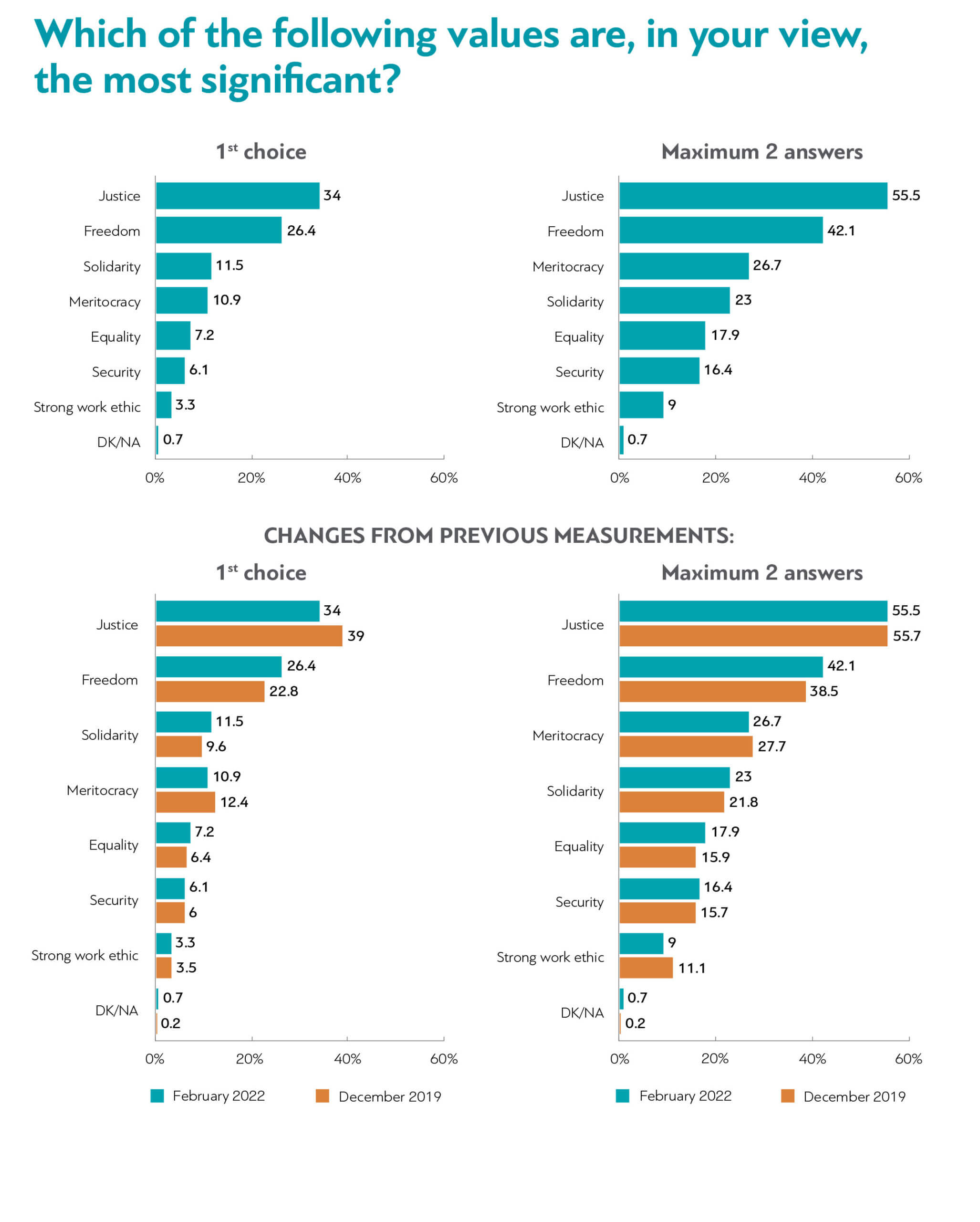
In addition, a large majority of Greeks is positively disposed towards "competitiveness" (76.2%) and "reforms" (70.1%), while majority percentages view "compromise" (53.2%) and "privatization" (47.2% vs. 41.9%) as something positive. In contrast, most Greeks are negatively disposed toward "trade unionism", "banks", "multinationals" and "the stock market". These views towards these concepts have remained relatively stable over the last 7 years.
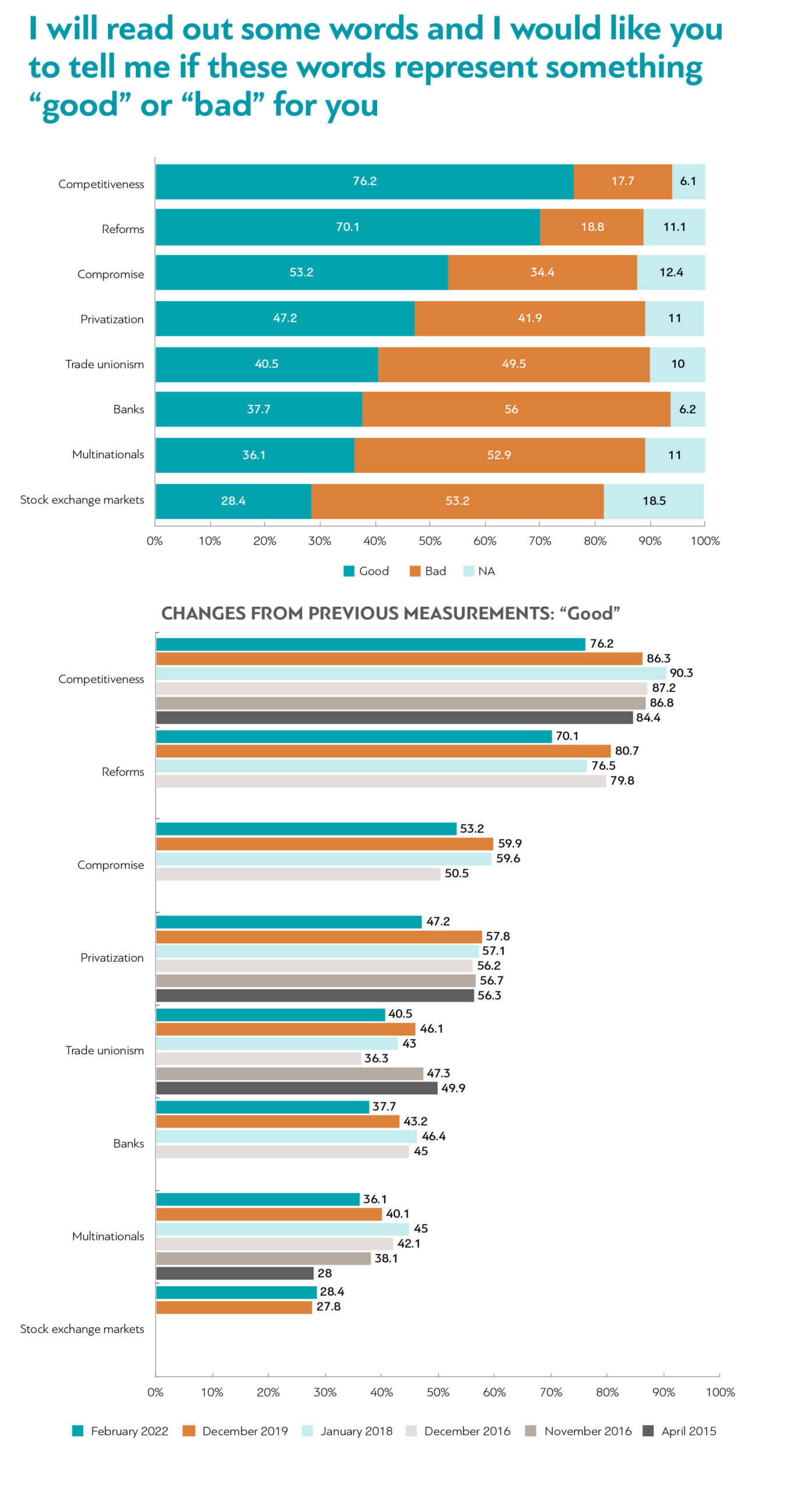
In a question asking respondents to express their views about the relevance of a wide range of values and quality of life in Greece, the majority of Greeks answered, for the first time in 2022, that none of these values are respected or applied in their country. Greeks do not believe that "the rights of minorities are protected" (47.8% said "very little" and "not at all"), or that citizens enjoy the freedoms expected from a democracy (56.3%), or that they live in a safe environment (67.6%), or that the judicial system treats everyone as equal (72.6%) or that recognition and reward are based on merit (80%).
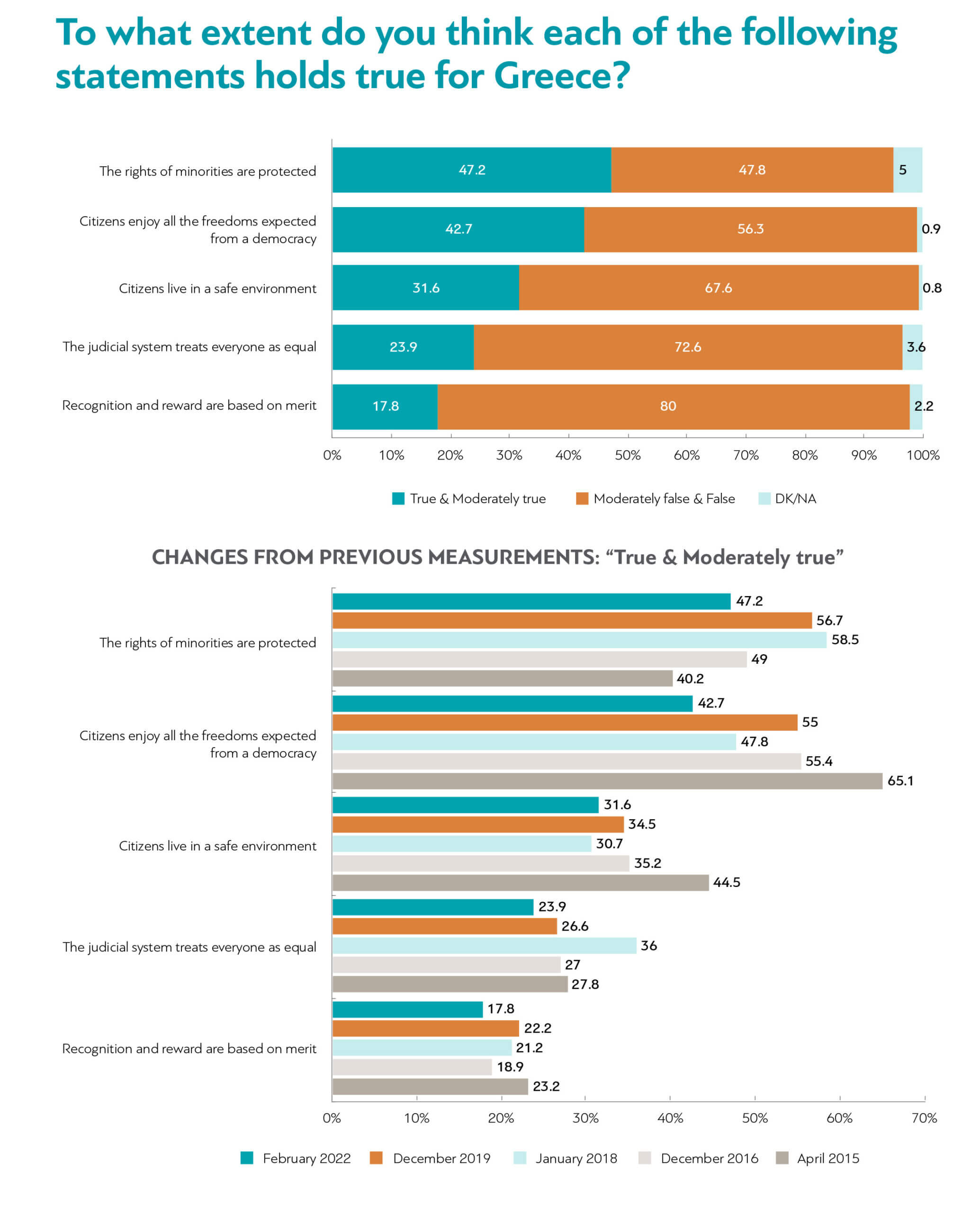
We then asked respondents to rate eight words describing various ideological positions. The majority of Greek citizens expressed a positive attitude only towards "socialism" (53.2%) and "liberalism" (52%). The majority of Greeks expressed a negative opinion on all other major ideologies, from "neoliberalism" (47.6% negative opinion) to communism (69.8% negative opinion). On this point, some historic changes have been recorded in the last seven years. In 2015, 52.5% of Greeks perceived "the left" as something good; in 2022 this figure dropped to 32%. In 2015, 40.5% of Greeks perceived "radicalism" as something good; in 2022 this figure dropped to 19.6%. In 2018, 41.1% of Greeks stated that "neoliberalism" is something good -in 2022, only 25% agreed.
There is, finally, another point worth mentioning, which may well offer an explanation for many of the findings included in the "What Greeks Believe" survey. The "World Values Survey", another important social survey conducted at regular intervals in dozens of countries around the world, includes the following question: "Would you say that most people are trustworthy or that you have to be very careful when dealing with other people?" One of the most interesting findings which emerged from that survey, when we ran it in Greece back in 2017, was that the answers the Greek people gave were much closer to those of respondents originating from African and Middle Eastern countries, and very far from the responses given by citizens of European or "Western" countries. We repeated this question with the exact same wording in 2022, in the course of the "What Greeks Believe" survey, to see if anything had changed and, indeed, the previous findings were confirmed: only 10.1% of Greek people believe that "most people are trustworthy". And which is the population group which is most mistrustful of others? The one that has been living in Greece, among Greeks, for the longest time: the 65+ year-olds (4.8%).
You can read all findings of the survey here (in Greek) and the findings of the second part (also in Greek) here:
SURVEY FINDINGS - PART B (PDF)
OVERVIEW OF FINDINGS - PART B (PDF)
SURVEY QUESTIONNAIRE - PART B (.DOCX)
SURVEY FINDINGS - PART B (.XLS)
SURVEY FINDINGS - PART B (.SAV)
REPORT: WHAT DO THE GREEKS BELIEVE 2022 - PART B (.PDF)
